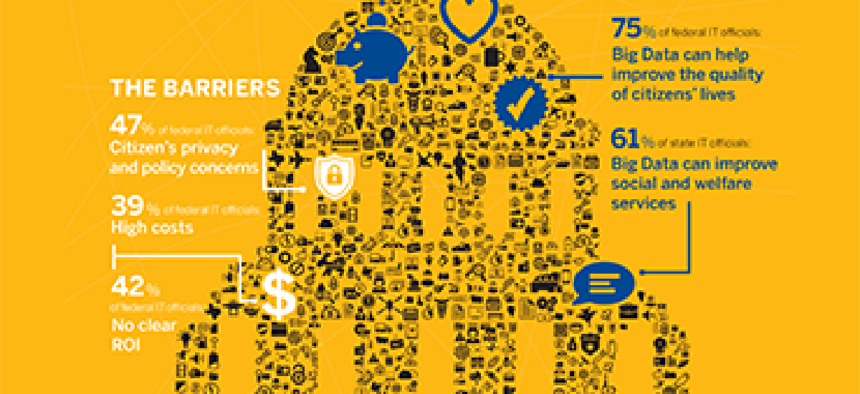Survey: Feds believe analytics can save lives, money

New study finds hopes for big data are high, but questions remain about proving return on investment.

A breakdown of some of the findings of the SAP/TechAmerica big-data study. (Graphic: TechAmerica)
A majority of federal IT officials believe big data and other analytics tools have the potential to make the government more efficient and improve public health and safety, according to a new study released by the TechAmerica Foundation on Feb. 20.
The survey, commissioned by SAP and conducted by pollsters Penn, Schoen and Berland, gleaned insight from 200 public IT officials at state and federal levels, of whom 75 percent or more said big data could help government cut the federal budget, save lives, enhance citizens' quality of lives and reduce crime.
TechAmerica President Jennifer Kerber said the survey results backed a big-data report the foundation presented to the Congressional High-Tech Caucus in October 2012, which attempted to define "big data" and presented several use cases detailing how agencies were making use of it.
"The findings from this study underscore the infinite potential of big data and reaffirm the findings of our big data commission," Kerber said in a statement. "That governments can save money and improve their service to citizens is clear from this study but it's also clear that we must find ways to overcome adoption barriers -- quickly."
Highlights from the survey include:
- Substantial budget cuts: Federal IT officials say real-time analytics of big data can help the government cut at least 10 percent annually from the federal budget by discovering wasteful spending. For example, such analytics can detect improper healthcare payments before they occur.
- Lifesaving potential: According to 87 percent of federal IT officials and 75 percent of state IT officials, the use of real-time big data solutions will save a significant number of lives each year. For example, medical researchers can aggregate information about healthcare outcomes to reveal patterns that lead to more effective treatments and detection of outbreaks.
- Crime reduction: 75 percent of state IT officials see the practical benefits of big data in medicine and public safety as extremely beneficial. Police departments are currently using big data technology to develop predictive models about when and where crimes are likely to occur, helping dramatically reduce the overall crime rate in specific locations.
- Enhanced quality of life: Real-time big data is helping the government improve the quality of citizens' lives, according to 75 percent of federal IT officials. For example, by gaining insight into huge volumes of data across agencies, the government can provide improved, personalized services to citizens.
While the study focuses heavily on views of big data in the future tense, many challenges remain for agencies if big data is to be the widely used tool it is sometimes touted to be.
Almost half of federal IT officials surveyed ranked privacy concerns as the "biggest barrier" toward big data adoption, citing the perceived relationship between big data and "Big Brother."
About 40 percent of federal and state It officials surveyed said high costs were another barrier cash-strapped agencies will have a tough time overcoming; and that database queries take "too long using traditional database technology.' Another 42 percent on the federal side said returns on investment lacked sufficient clarity.
Big data is not yet part of the government's "holistic" IT approach, according to Dante Ricci, senior director of SAP's global public sector, but the biggest challenges are on the human side of the equation, not the technological side.
"What we've seen so far by this survey is the education of customers and the knowledge of what big data can deliver has grown exponentially over the last 18-24 months," Ricci said. "Is this something done holistically in the government right now? No. But we're still learning how to best understand how people, policy, operational processes and user experience can fit together with big data technology enablers across enterprise."
Ricci added that certain technologies, like memory, necessary for big data platforms are getting cheaper, and touted that big data can lower the total cost of an IT landscape if implemented properly.
While it can be expensive to implement a big data solution, Ricci said agencies can get the most bang for their bucks by outlining expected outcomes, "starting small and targeting a highest-value use case," before executing a project.
NEXT STORY: Is the CDC Wrong to Endorse Tamiflu?



